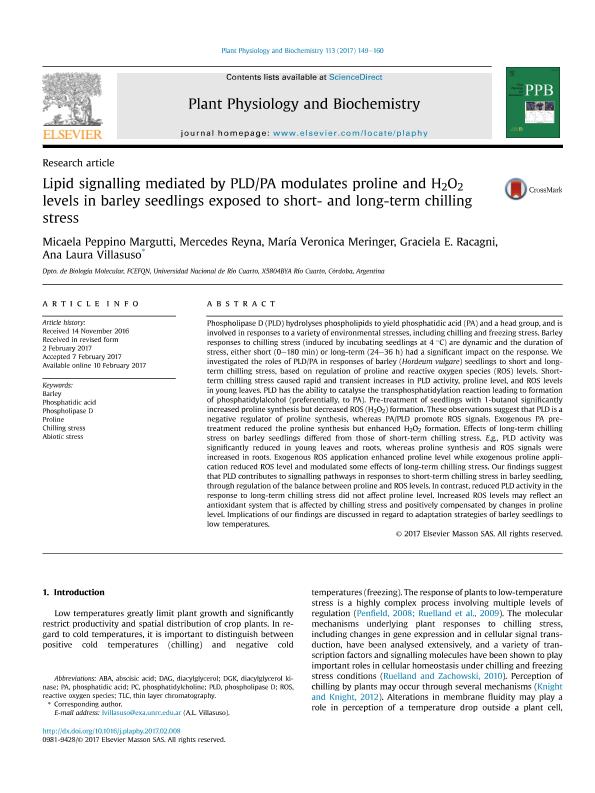Artículo
Lipid signalling mediated by PLD/PA modulates proline and H2O2 levels in barley seedlings exposed to short- and long-term chilling stress
Peppino Margutti, Micaela Yesica ; Reyna, Mercedes
; Reyna, Mercedes ; Meringer, Maria Veronica
; Meringer, Maria Veronica ; Racagni, Graciela Esther; Villasuso, Ana Laura
; Racagni, Graciela Esther; Villasuso, Ana Laura
 ; Reyna, Mercedes
; Reyna, Mercedes ; Meringer, Maria Veronica
; Meringer, Maria Veronica ; Racagni, Graciela Esther; Villasuso, Ana Laura
; Racagni, Graciela Esther; Villasuso, Ana Laura
Fecha de publicación:
04/2017
Editorial:
Elsevier France-Editions Scientifiques Medicales Elsevier
Revista:
Plant Physiology and Biochemistry
ISSN:
0981-9428
Idioma:
Inglés
Tipo de recurso:
Artículo publicado
Clasificación temática:
Resumen
Phospholipase D (PLD) hydrolyses phospholipids to yield phosphatidic acid (PA) and a head group, and is involved in responses to a variety of environmental stresses, including chilling and freezing stress. Barley responses to chilling stress (induced by incubating seedlings at 4 °C) are dynamic and the duration of stress, either short (0–180 min) or long-term (24–36 h) had a significant impact on the response. We investigated the roles of PLD/PA in responses of barley (Hordeum vulgare) seedlings to short and long-term chilling stress, based on regulation of proline and reactive oxygen species (ROS) levels. Short-term chilling stress caused rapid and transient increases in PLD activity, proline level, and ROS levels in young leaves. PLD has the ability to catalyse the transphosphatidylation reaction leading to formation of phosphatidylalcohol (preferentially, to PA). Pre-treatment of seedlings with 1-butanol significantly increased proline synthesis but decreased ROS (H2O2) formation. These observations suggest that PLD is a negative regulator of proline synthesis, whereas PA/PLD promote ROS signals. Exogenous PA pre-treatment reduced the proline synthesis but enhanced H2O2 formation. Effects of long-term chilling stress on barley seedlings differed from those of short-term chilling stress. E.g., PLD activity was significantly reduced in young leaves and roots, whereas proline synthesis and ROS signals were increased in roots. Exogenous ROS application enhanced proline level while exogenous proline application reduced ROS level and modulated some effects of long-term chilling stress. Our findings suggest that PLD contributes to signalling pathways in responses to short-term chilling stress in barley seedling, through regulation of the balance between proline and ROS levels. In contrast, reduced PLD activity in the response to long-term chilling stress did not affect proline level. Increased ROS levels may reflect an antioxidant system that is affected by chilling stress and positively compensated by changes in proline level. Implications of our findings are discussed in regard to adaptation strategies of barley seedlings to low temperatures.
Palabras clave:
Abiotic Stress
,
Barley
,
Chilling Stress
,
Phosphatidic Acid
,
Phospholipase D
,
Proline
Archivos asociados
Licencia
Identificadores
Colecciones
Articulos(CCT - CORDOBA)
Articulos de CTRO.CIENTIFICO TECNOL.CONICET - CORDOBA
Articulos de CTRO.CIENTIFICO TECNOL.CONICET - CORDOBA
Citación
Peppino Margutti, Micaela Yesica; Reyna, Mercedes; Meringer, Maria Veronica; Racagni, Graciela Esther; Villasuso, Ana Laura; Lipid signalling mediated by PLD/PA modulates proline and H2O2 levels in barley seedlings exposed to short- and long-term chilling stress; Elsevier France-Editions Scientifiques Medicales Elsevier; Plant Physiology and Biochemistry; 113; 4-2017; 149-160
Compartir
Altmétricas



